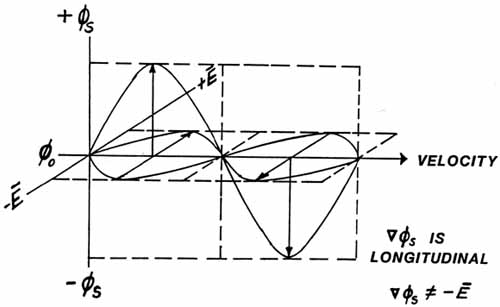On
this slide we now show a simple way to make a scalar, zero-vector wave
-- the kind of wave originally discovered by Nikola Tesla.
It's
simple. We just believe that a sum-zero vector substructure makes
a scalar quantity, and we MAKE some scalars that way.
We
also understand that a zero-gradient of a scalar is a zero vector, so
that the scalar itself may be taken to be a zero vector.
The simplest
explanation of this wave is as follows:
First,
in physics we have two competing, mutually exclusive theories as to the nature
of electromagnetic energy: the wave theory and the particle
theory. Physicists argued for decades over these theories, for
some experiments support one and some support the other. They
never solved the problem; they just agreed to quit arguing. They
formulated the "duality" principle to allow the saving of face
to both sides.
Briefly,
the duality principle implies that, whatever the nature of
electromagnetic energy is before an interaction, in the interaction you
can get it to act as a wave or as a particle. In other words, AS
IT EXISTS, BEFORE THE INTERACTION, it is implicitly both particle
and wave, joined together in some fashion, without being explicitly
either one.
With the
fourth law of logic, this becomes perfectly clear. With three-law Aristotlean
logic, the problem is unresolvable.
Let us
use this idea of "explicit duality without implicit duality"
to analyze the wave shown on the slide.
First, from
a wave aspect, the E-fields and the B-fields of the two waves do
superpose and vectorially add. Since the waves are 180 degrees out
of phase, the exterior resultant wave has a zero electric field and a
zero magnetic field. Therefore it is a "zero-vector"
wave, or "scalar" wave. It's a wave of pure stress in
spacetime.
However,
this scalar wave has a precisely determined substructure, consisting_of
two ordinary sine waves, each of which comprises an ordinary E-H vector
EM wave.
Now we apply
the photon consideration (remember, before we interact with the wave, it
must implicitly possess BOTH wave and particle natures combined, and we
have so far only examined the implication of the wave nature.
The theory
of photons' states that they are monocular critters. Photons pass
right through other photons without interaction, in a linear situation.
Therefore they can coexist without interaction, which is what we show
here.
One photon,
by the way, is one wavelength .
The photon
theory requires that both substructure waves continue to exist as
independent photons. Therefore we are assured that our
substructure is intact.
However,
notice that the totality of the two waves stresses
spacetime. In other words, we have twice the stress on spacetime
now as we would have from either wave separately.
This wave is
therefore just a pure stress wave in spacetime itself.
This thing
oscillates time, oscillates the relativity of the situation, and can affect
energy, time flow rate, inertia, gravity, etc. aspects of an absorbing
system.
Note that
we have a rhythmic oscillation in phi (Ø), and we have a longitudinal
stress wave, very similar to a sound wave. The MEDIUM for this
wave is the virtual particle flux that identically comprises vacuum
spacetime itself.
Next Slide
|

